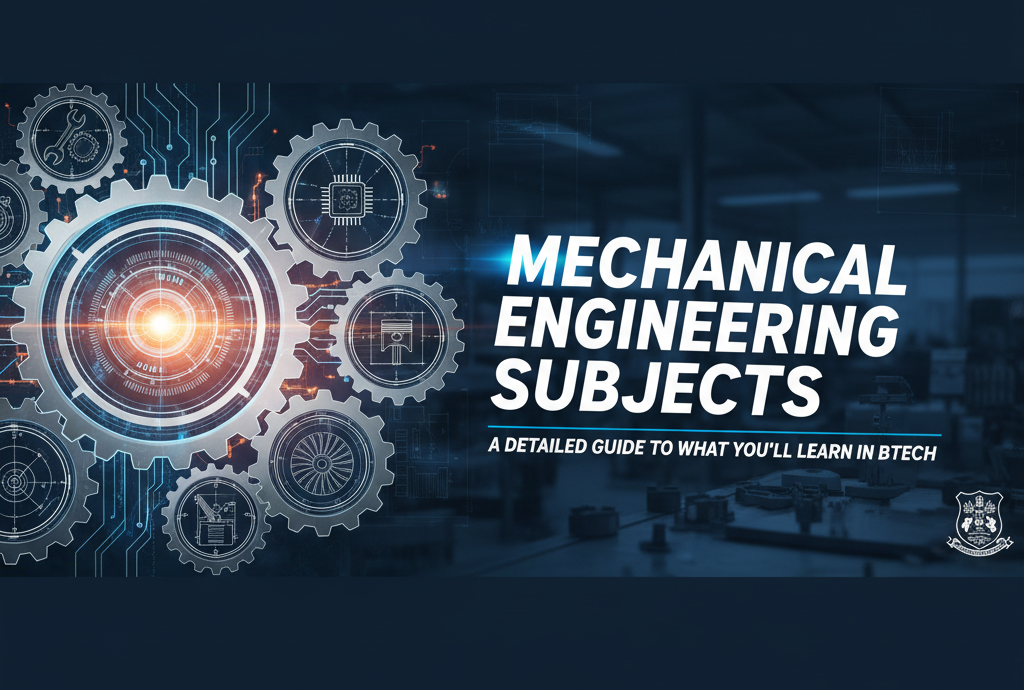
Mechanical engineering is often called the “Mother of Engineering” because it has laid the foundation for many technical sectors. If you’ve ever wondered what mechanical engineering is, you’ve come to the right place. Although it is one of the broadest engineering disciplines, mechanical engineering activities revolve around everything you can see or feel around you.
The BTech mechanical engineering syllabus is designed to offer students a balance of theory, analysis, and problem-solving in the core mechanical concepts. Throughout the detailed mechanical engineering syllabus, students attain both the required practice and knowledge to innovate in areas including manufacturing, energy, transportation and robotics. This guide covers the most important mechanical engineering subjects each semester, what you will learn in each, what to expect and how they prepare you for a successful career.
The Foundational First & Second Years
During the initial semesters, a B.Tech mechanical engineering curriculum tries to establish a strong base. These years arm students with the mathematical and scientific tools and knowledge they will use for the rest of their work lives.
- Engineering Mathematics and Physics: Substantial background in mathematics (calculus, differential equations, linear algebra) and physics is the foundation for analysing complex problems. Irrespective of whether you are making a small lever or modelling a complex turbine, these are the baseline skills.
- Engineering Mechanics: Static and dynamic systems (forces on objects at rest and forces on moving objects). This subject also provides students with a basic understanding of the principles of motion and structural performance. It is the backbone of the mechanical engineering syllabus and affects every design decision.
- Thermodynamics: This subject teaches about heat, work, energy transfer and the principles of thermodynamics. Applications range from engines, HVAC and refrigeration to power and process plants.
- Fluid Mechanics: Knowing how liquids and gases behave while still or in motion is important in designing pumps, pipelines, and even the wings of an aircraft. This is one of the most well-utilised mechanical engineering subjects in the real world.
Core Mechanical Engineering Subjects
As students advance through the program, they will delve into the core mechanical engineering syllabus, where theory and hands-on design skills merge.
- Manufacturing Processes: Covers casting, forging, welding, machining, and even new methods like 3-D printing. It bridges design theory and production, teaching engineers how to create a design that not only appears as intended, but is also optimised to be cheaper to manufacture and more reliable.
- Strength of Materials (Mechanics of Solids): Explores how materials respond under various loads, with a focus on stress, strain, and deformation. This ensures engineers design safe and long-lasting structures.
- Machine Design: Students learn to design machine elements, including shafts, gears, and bearings. It’s a crucial integration of all earlier subjects, applying them to build reliable machines.
- Heat Transfer: An in-depth analysis of conduction, convection, and radiation: it is essential for the design of cooling systems, heat exchangers, and thermal insulation.
- Instrumentation and Control Systems: This subject teaches the measurement of temperature, flow, and pressure, as well as the control of machines automatically. It bridges mechanical systems with electronics, making automation possible.
The following mechanical engineering subjects lay the foundation of the career, and every mechanical engineering student should be thoroughly aware of these.
Advanced & Elective Subjects
In the final years, the B.Tech mechanical engineering curriculum allows students to specialise through electives and advanced topics.
- Robotics: Deals with the development and use of robots in industries, medicine, and the transportation sector.
- Finite Element Analysis (FEA): A computer-based tool to test designs under forces, heat, or pressure before making prototypes.
- Automobile Engineering: Covers mechanics, design, and technology of cars.
- Aerospace Engineering: Specialises in aircraft and spacecraft design for students passionate about aviation and space exploration.
These electives expand the mechanical engineering curriculum, enabling students to tailor their degree to suit their individual interests and career objectives.
Practical Skills Imbibed in the B.Tech Mechanical Engineering Students
Practical knowledge is equally essential in mechanical engineering, as it enables students to apply theoretical concepts to real-world situations.
- Laboratory Work: Involves conducting experiments in thermodynamics, fluid mechanics, and material science, which allow students to translate theoretical concepts into practical understanding.
- CAD/CAM Software: AutoCAD and SolidWorks are integral CAD/CAM software solutions that have become essential components of the design and manufacturing process. Students will be able to create accurate models and simulate the engineering process.
- Projects and Internships: Offer students the chance to earn industry experience, tackle real-world challenges, and prepare students for careers in industries ranging from automotive to aerospace to energy.
Through a blend of campus instruction and real-world practice, students have the chance to learn skills that will help them grow into the first leaders of tomorrow’s industry.
Career Opportunities for Mechanical Engineering Graduates
Mechanical engineering offers a diverse range of jobs across various sectors, due to its versatility. It has applications in the automotive, aerospace, energy, robotics, manufacturing, HV/AC, and defence industries, and graduates can be employed in any of these areas. Many also work in consulting, research and development, and the public sector.
Key career roles include:
- Design Engineer: Specialising in product design, modelling, and innovation.
- Production/Manufacturing Engineer: Responsible for the production process that meets customer quality specifications.
- Maintenance Engineer: Responsible for the reliable and efficient running of machinery and systems.
- Thermal/Power Engineer: Power plants, renewable energy, and HVAC systems, etc.
- Auto/Aero Specialist: Contributing to the design and performance of vehicles and aircraft.
Beyond traditional paths, mechanical engineers are increasingly finding opportunities in automation, renewable energy, AI-driven manufacturing, and robotics, making the field future-ready. And this flexibility in the curriculum is what makes the mechanical engineering syllabus so broad. It trains students to adapt and succeed in a variety of industries.
The Role of Internships and Hands-On Projects
Theoretical learning imparts knowledge, but internships and projects inculcate an engineer’s mindset of solving real-world problems. Internships allow students to experience industrial workflows, professional tools, and collaborative environments, which cannot be fully captured in textbooks.
Hands-on projects, either as part of the B.Tech mechanical engineering curriculum or independently, help students apply concepts such as thermodynamics in design, fluid mechanics in design, and machine design to practical problems. For example, designing a miniature turbine, building a robot arm, or developing a coolant system lets students experiment and fine-tune what they’ve learned in the classroom.
These experiences also foster essential soft skills, such as teamwork, project management, and communication, that are crucial for career development. This can go a long way, as employers want students who cannot only understand but also apply the mechanical engineering subjects; and it will be your projects and internships that will provide you with that hands-on experience.
Knowledge of Industry Software Tools Beyond CAD/CAM
Whereas tools like AutoCAD, CATIA, and SolidWorks are an inherent part of the Mechanical engineering syllabus, the fact remains that as we step into the modern era, industries demand that we are well-versed in a couple of other software as well.
Some widely used tools include:
- ANSYS: For finite element analysis (FEA), structural integrity, and thermal simulations.
- MATLAB/Simulink: For algorithm development, control systems, and mathematical modelling.
- Creo (Pro/ENGINEER): Used for creating 3D product concepts and running advanced engineering simulations.
- MSC Adams: For motion and dynamics analysis of mechanical systems.
- COMSOL Multiphysics: For coupled physics simulation (thermal, fluid, and structural).
- HyperMesh: Meshing and model prepping for analysis.
Knowledge of these tools enables graduates to transition seamlessly into roles that require advanced design validation and simulation, making them highly employable in competitive industries. Through the fusion of computational software experience with theory, students can pursue successful careers in technology-rich, modern mechanical engineering.
Conclusion
The Mechanical Engineering Syllabus encompasses everything from physics and mathematics to more complex materials such as robotics and FEA. For students in search of ‘What is mechanical engineering?’, the secret lies within its broad scope. It prepares you for a variety of sectors by combining coursework that makes you better at doing a job with an understanding of what can be done with what you do.
Although tough, the BTech mechanical engineering curriculum pathway is one of the most flexible in engineering. By understanding the core aspects of mechanical engineering subjects, students can access cutting-edge, rewarding, and futuristic careers.
FAQs


